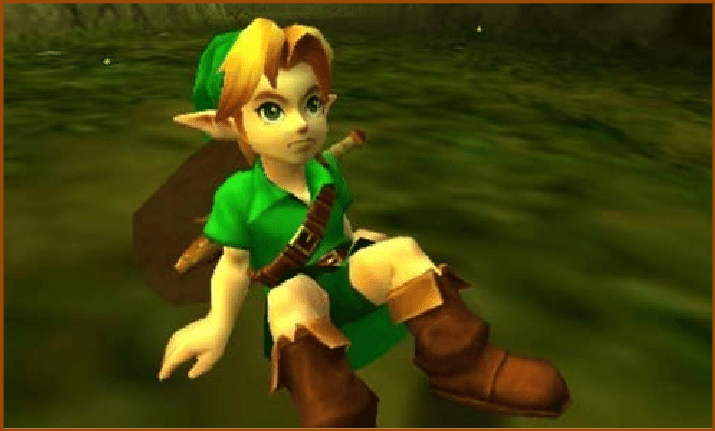My Favorite Characters
Child Link (Ocarina of Time)
When it comes to video games, Ocarina of Time was my first love. I picked it up in the seventh grade, which was a very formative time in my life.
Nothing would prepare me for the grief of OoT. Ocarina of Time is about change and loss and aptly captures the impermanence of life. We start the story with a dying Great Deku Tree, a father figure to the Kokiri. Then, we leave the Kokiri, Saria included, behind.
There's something so tragic about leaving vulnerable children behind, left to fend for themselves. This directly corresponded to what was happening in my life. The last of my older siblings was entering college and it generated a sense of betrayal and abandonment because there was no one to protect me anymore at home or at least buffer my experience. It's a valid way to feel, but it wasn't my older sibling's faults; they had a quest to fulfill, and it wasn't their job to protect. The same is true for Link.
The most shocking point of OoT was child Link inadvertently allowing Ganondorf to destroy the world by opening up the Door of Time. Child Link is then transported seven years in the future where he is met with a ruined world. I'd like to think he blames himself for the world's outcome. As players, we are well acquainted with the world as it was before, amplifying the impact of its destruction. We wish things could go back to the way they were before.
Another aspect of Link is stolen youth. He is unable to be a kid. He is thrusted into adult affairs, forced to grow up too fast, and carries the weight of saving the world on his shoulders.
There's also a loneliness to being the odd one out. The not-actually-Kokori boy with no fairy, tasked with a quest only he can carry out. I think there's something to be said about desperately wanting to grow up, gain responsibility and freedom, only to grow up and face the horror that nothing is like what you expected it to be. You wish to be a kid again. Even if things weren't great then, at least it's not this.
As some solace, though, art imitates life. When something dies or reaches its conclusion, something is born in its place. The dead Deku Tree is replaced by the Deku Tree Sprout, and Link's stolen childhood is given back to him at the end of the game.
Goro Akechi (Persona 5)
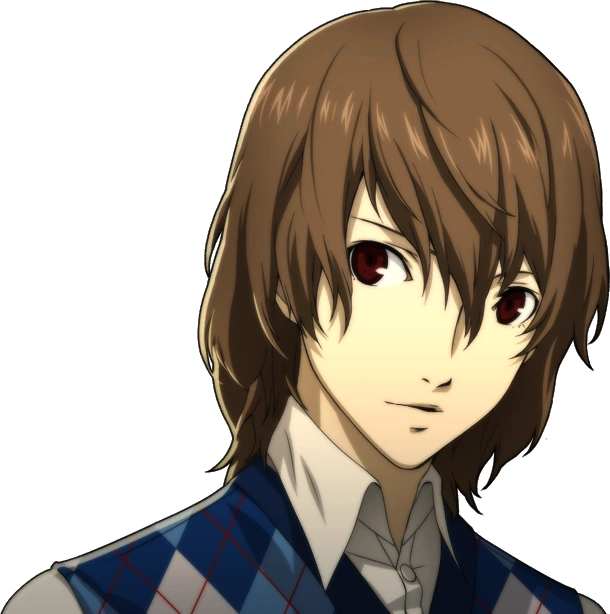
Ah, the boy attributed to the Justice Arcana. It doesn't get more on the nose than that; however, his drive for justice comes from a selfish place.
Akechi follows the blueprint of many neurodivergent teens. He's gifted and high-achieving, but it comes at a cost. He puts on a mask of perfection and charisma to hide the shame of who he really is, a person that wasn't wanted. It's a lonely existence, acting like someone you're not. It also fragments his identity. Akira is probably his only friend, but acquaintance might be a better word. I can't help but think he experiences intense self-loathing, and I'm inclined to read him as Quiet BPD and or high-masking Autistic, but the latter feels more like a stretch.
I love how he holds himself when masking. He's overly formal, serious, and restrained. As someone who is overly-competitive, I love how seriously Akechi takes his challenges against Akira. He comes alive and shows some of that real bite he has to himself, because masking is boring and usually corrosive. I love, too, how unhinged he is as the Black Mask, and it leaves me wanting more. The throwing of the glove is iconic and very symbolic. I think if someone did that in real life, it would be considered "cringe," but I admire the earnestness.
I sense that Akechi was someone who had to grow up too fast because of his circumstances. Not only this, but his entire life was consumed by his purpose– to get revenge on his father. If he were to live on post-game, I headcanon him regressing in skill and not knowing how to be a functional adult, likely feeling empty and directionless. There's actually a really good (explicit) fanfic that incorporates that idea.
Goro's also unable to see how capable he is. After facing off and losing to the Phantom Thieves, he laments, "In the end... I couldn't be special." Makoto reflects back the real truth: "It pains me to admit... but your wit and strength far exceeds ours. We only defeated you by teaming up..."
Although his death is left ambiguous, I consider him dead. His life's purpose was to enact his revenge on Shido, and his actions laid the foundation for his demise. It's tragic to watch a beautiful, capable kid throw away his life because of his obsession. It makes you wonder, if only things were different for him.

"Under different circumstances, we could have been great rivals... or perhaps even friends."
L (Death Note)
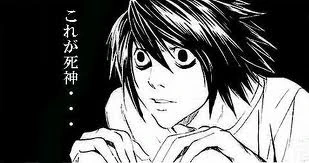
I love me a character with a strong sense of justice. It's unsurprising in retrospect that this show, and later Persona, would appeal to my young, Autistic self. A shining moment in the series is when Light and L proclaim, "I am justice," in unison. It communicates that everybody's definition of justice differs; there's no universal, fixed value system.
Speaking of autism, L is undeniably Autistic. I think he's relatively unmasked too. His "quirks" are endearing, and the characters don't really bat an eye at him. There's a kind of acceptance for who he is, perhaps only earned due to his intellectual prowess. I don't know for sure.
Part of what makes him such a strong character is being both a parallel and foil to Light Yagami.
L doesn't have friends, and really, I don't think Light does either. Sure, he's popular, but I can't think of a friendship he really valued outside of what the person could provide to him. In regards to L, I truly believe L considered Light to be his first and only real friend— they were the only ones to truly understand each other— and I find it really tragic. Light and L have found something rare: someone is on their level. Their brains function differently than everyone else, and that creates a disconnect. But Light and L just mesh. There's energy there. They feel like home to each other. I think I've only met one person in my life that came close to understanding who I was, in all my alien-ness, and that felt like home, and it was naturally an intense, special connection.
Light and L definitely have homoerotic tension too, whether you ship them or not; it's palpable.
Shinji Ikari (Neon Genesis Evangelion)
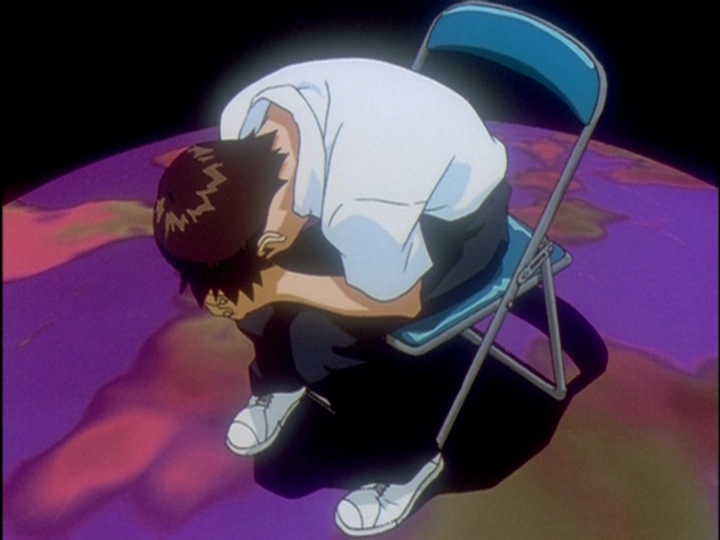
Shinji is definitively not a good person; however, I see myself in him. He's a victim of his circumstances. He is alone. He yearns for acceptance, especially from his father, and wants others to love him, but he's too scared– or too wounded– to get close to others.
A normal childhood doesn't exist for someone who was bestowed the weight of the world on his shoulders. He's meek and he doesn't know what he wants. He exhibits a lack of agency; there is no self-trust and he is unable to make choices for himself. I've long struggled with self-trust and while some people find his inaction pathetic, I completely sympathize.
Shinji is drowning: I see no way out for him, doomed by the narrative.
Sunny (Omori)
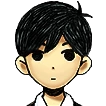
Sunny is characterized as a quiet, scared, and emotionally blunted person. He takes refuge in his dream world, and I think it's a clear mark of dissociation. I take comfort in knowing I'm not the only one who is overwhelmed by the outside world, and chooses to stay inside a majority of the time.
I assume Sunny struggles with a great deal of self-loathing. He's proclaimed by the narrative to be "waiting for something to happen." He's stuck in freeze mode ever since the accident.
A part of Sunny loves himself enough to protect himself. Omori and Headspace exists to bury the shame and the ugly truth, as seen by the uncovereing of the deeper, more disturbing, but more honest layer that is Black Space.
The narrative invites Sunny to forgive himself, even though it's difficult and terrifying. A major repercussion to refusing to face the truth is that Sunny will forever be haunted by Something, which is a manifestation of his crushing guilt. He would choose a long-term discomfort to avoid the short-term discomfort of telling the truth. Sometimes we subject ourselves to more suffering too by avoiding discomfort. I would know; I tend to be avoidant in the face of conflict.
When I learned of the Truth, I was disappointed. I thought to myself, "If that were me, I could never forgive myself. Sunny should never be forgiven." I quickly realized that was the entire point of the game. That's why Sunny went to such extreme lengths to avoid acknowledging that fateful incident.
Basil (Omori)
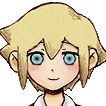
A major feature of Basil is his abandonment issues. Similar to Sunny, Basil is waiting for someone to save him from his misery. He's posed from the beginning as an easy target, but I think Basil is exceptionally resilient and strong for surviving as long as he did under the crushing guilt of doing something very wrong. I resonate with the absolute desperation of doing anything just to make and keep friends.
Miles Edgeworth (Ace Attorney)
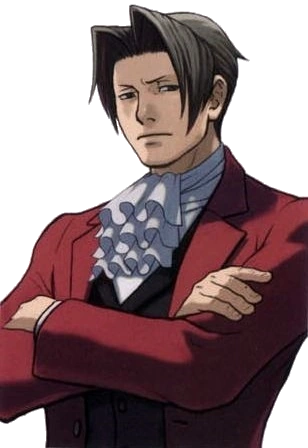
Early game Miles is insufferable, but I like when he eases up. I like how he's rigid and emotionally closed off. He pushes people away when the going gets tough.
"Prosecutor Miles Edgeworth chooses death," is a great, dramatic example of how he self destructs when distressed, and just as people begin to see the real him. It feels very BPD coded, sort of threatening suicide when under duress, and then basically cutting everyone off. I don't even headcanon him as having BPD, but it was a morally unkind thing to do, and not something an emotionally well-adjusted person would do.
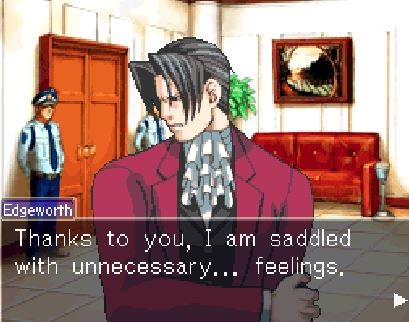
He's deeply in love with Phoenix Wright. Makes for really good #mutual pining and #slow burn stories. Here's a fun (explicit) fanfic. Bonus points for #found family and otherwise masterfully interweaving the ensemble cast from Apollo Justice.
Young Satoru Gojo (Jujutsu Kaisen)
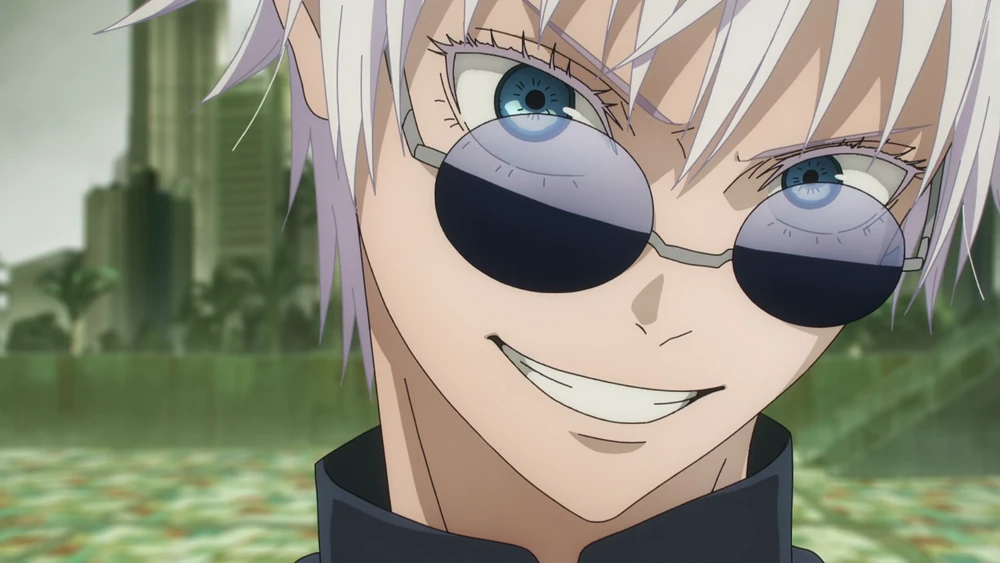
Young Satoru Gojo lacks a distinctive moral compass, and he instead turns to Geto for moral direction. I love how he literally keeps people at arms length 24/7 with Infinity.
Him becoming the strongest is what further separates him from others, including Suguru Geto. Gojo is gifted and he never had to question it, or really try. Everything comes easily to him.
I've seen Gojo read as neurodivergent/Autistic. It's usually a pretty shallow interpretation and borders infantilization, but I think it can be applied when talking about his innate talents as another case of the gifted-child syndrome. I think sometimes us ND folk are only really valued for our proficiencies, and it's not really fair to us because we're all so much more than just our talents. It was a low blow for Geto to point out Gojo's status as "the strongest" in their post-betrayal conversation. Prior to the betrayal, Geto paid no mind to Gojo's strength, and he was perhaps the only one who really saw past it. I think in that moment though, Geto stopped viewing Gojo as a peer and more as an obstacle.
To speak more on Gojo, I, along with other Autistics, have an experience of the world where I take in 200% of the sensory input to process. It's overwhelming and exhausting. For me, my ears give me the most trouble, and I need to temper it by wearing ear plugs or noise cancelling earbuds. For Satoru Gojo, his eyes are taking in an ungodly amount of information. His blindfolds and sunglasses are a self-accommodation that allows him to function. I found a video called Gojo Satoru Must Cover His Eyes To Stay Human, and while I didn't glean anything notable from the video, the title is an apt description. To cover his eyes is to enable himself to function in a neurotypical world. Otherwise, he would be exhausted.
Young Suguru Geto (Jujutsu Kaisen)
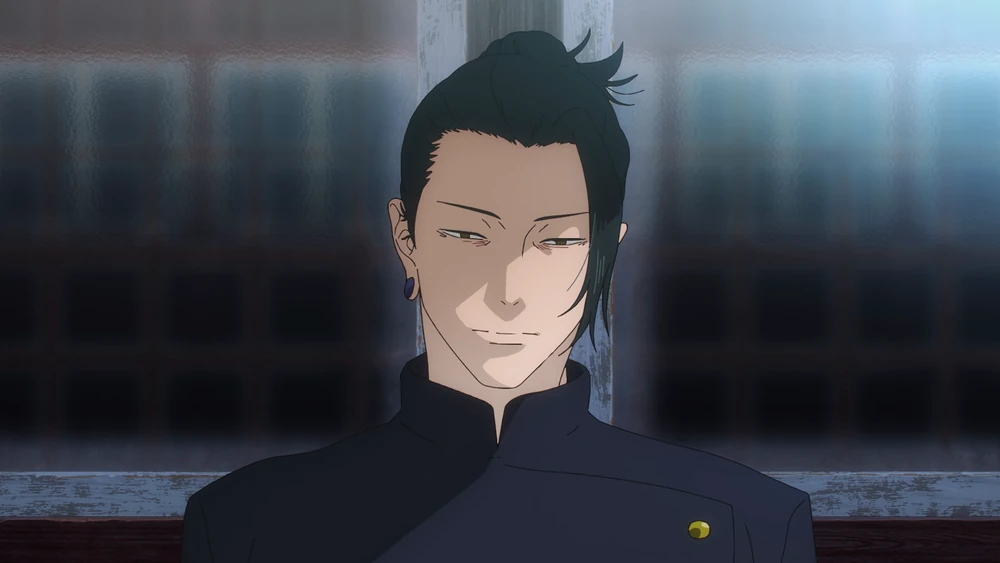
The most notable characteristic of young Suguru Geto is his strong, rigid moral compass, which is in direct contrast to his peer and foil, Satoru Gojo.
Many times in conflict I've held my tongue, in order to spare the feelings of others. I thought I was doing them a favor, but when matters remain repressed and unspoken, the resentment builds. I think part of the reason everything fell apart for Geto is because he didn't have a strong "why" for protecting the weak, other than it being "the right thing to do." There's mounting resentment for a thankless job. He doesn't take care of himself or ask for help.
Gojo may blame himself for not noticing his friend's pain sooner, but the responsibility was on Geto to reach out. I don't agree with Geto's behavior post-betrayal; I think it's disgusting. Though, it's a mark of a good villain, and good writing, when the audience absolutely hates them.
I think there's something symbolic with him having to swallow curses. He swallows his burdens, with all of its acrid taste, gags on it, and pushes it down to internalize, which allows his resentment to build, consume, and poison him.
Toji Fushiguro (Jujutsu Kaisen)
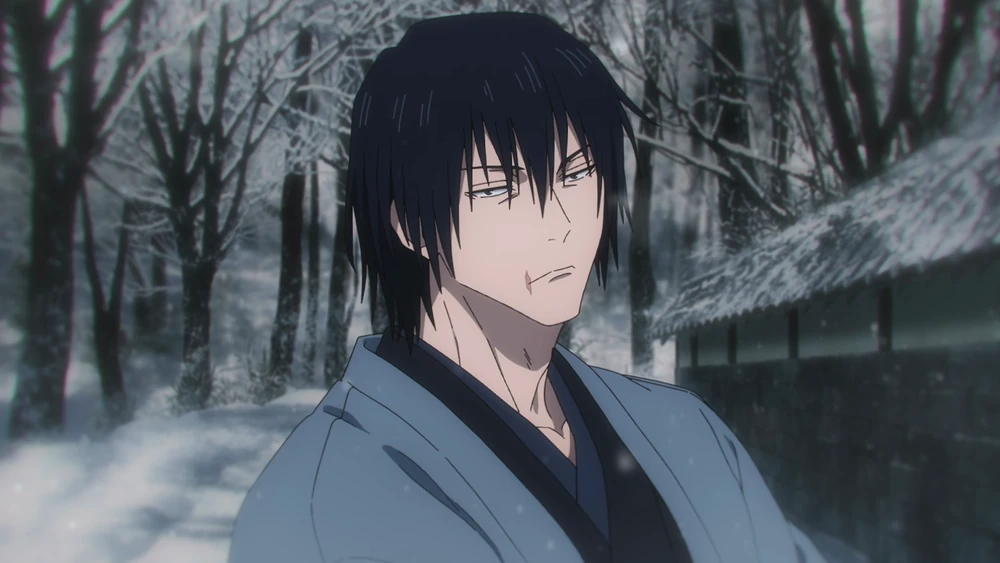
The "invisible man." Toji is the black sheep who is underestimated and overlooked, but he becomes extraordinary despite his circumstances. The tragedy of Toji is that he feels so much shame that he doesn't recognize how exceptional he is. He tried to escape his old life, and it worked for a while. It's implied his wife kept him grounded and hopeful, but then he regresses because of her death.
By the time we meet Toji, he thinks he's moved on from all the past bullshit, but his downfall is his preoccupation with his past.
On a separate note, naming his son "blessing" is so beautiful, despite Toji being an absent shithead father. I also find it beautiful when he recognized his son in his final moments, and showed relief at his outcome.
